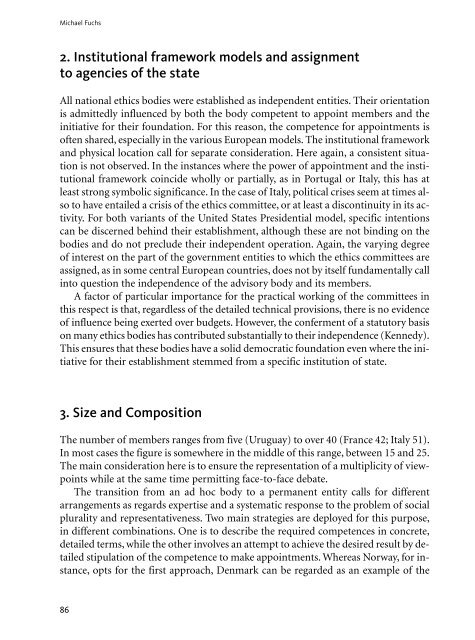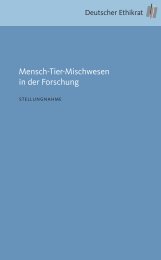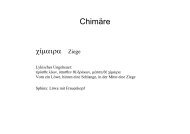Michael Fuchs National ethics councils - Deutscher Ethikrat
Michael Fuchs National ethics councils - Deutscher Ethikrat
Michael Fuchs National ethics councils - Deutscher Ethikrat
Create successful ePaper yourself
Turn your PDF publications into a flip-book with our unique Google optimized e-Paper software.
<strong>Michael</strong> <strong>Fuchs</strong> <strong>National</strong> <strong>ethics</strong> <strong>councils</strong>. Their backgrounds, functions and modes of operation compared<br />
2. Institutional framework models and assignment<br />
to agencies of the state<br />
All national <strong>ethics</strong> bodies were established as independent entities. Their orientation<br />
is admittedly influenced by both the body competent to appoint members and the<br />
initiative for their foundation. For this reason, the competence for appointments is<br />
often shared, especially in the various European models. The institutional framework<br />
and physical location call for separate consideration. Here again, a consistent situation<br />
is not observed. In the instances where the power of appointment and the institutional<br />
framework coincide wholly or partially, as in Portugal or Italy, this has at<br />
least strong symbolic significance. In the case of Italy, political crises seem at times also<br />
to have entailed a crisis of the <strong>ethics</strong> committee, or at least a discontinuity in its activity.<br />
For both variants of the United States Presidential model, specific intentions<br />
can be discerned behind their establishment, although these are not binding on the<br />
bodies and do not preclude their independent operation. Again, the varying degree<br />
of interest on the part of the government entities to which the <strong>ethics</strong> committees are<br />
assigned, as in some central European countries, does not by itself fundamentally call<br />
into question the independence of the advisory body and its members.<br />
A factor of particular importance for the practical working of the committees in<br />
this respect is that, regardless of the detailed technical provisions, there is no evidence<br />
of influence being exerted over budgets. However, the conferment of a statutory basis<br />
on many <strong>ethics</strong> bodies has contributed substantially to their independence (Kennedy).<br />
This ensures that these bodies have a solid democratic foundation even where the initiative<br />
for their establishment stemmed from a specific institution of state.<br />
3. Size and Composition<br />
The number of members ranges from five (Uruguay) to over 40 (France 42; Italy 51).<br />
In most cases the figure is somewhere in the middle of this range, between 15 and 25.<br />
The main consideration here is to ensure the representation of a multiplicity of viewpoints<br />
while at the same time permitting face-to-face debate.<br />
The transition from an ad hoc body to a permanent entity calls for different<br />
arrangements as regards expertise and a systematic response to the problem of social<br />
plurality and representativeness. Two main strategies are deployed for this purpose,<br />
in different combinations. One is to describe the required competences in concrete,<br />
detailed terms, while the other involves an attempt to achieve the desired result by detailed<br />
stipulation of the competence to make appointments. Whereas Norway, for instance,<br />
opts for the first approach, Denmark can be regarded as an example of the<br />
86<br />
second. In a few cases, the initial choice of members seems to have preceded the description<br />
of competences and the groups to be represented. This is true, say, of the<br />
NBAC in the United States (Capron, 66), whose exact composition was not described<br />
until its mandate was extended. A common feature of all models is that the membership,<br />
even if deliberately chosen from specific disciplines or backgrounds, is supposed<br />
to comprise independent individuals rather than representatives of a lobby.<br />
Occasionally, as in Norway or Ireland, there are explicit provisions to that effect.<br />
Subject expertise<br />
Unlike commissions with specific, narrowly defined terms of reference, the permanent<br />
bodies must possess a reasonably wide range of competences. In most cases, a<br />
spectrum extending from fundamental research to clinical application is required for<br />
the life sciences and medicine. In view of the breadth of the subject-matter to be covered,<br />
external experts are co-opted for individual deliberations. So are representatives<br />
of patients and other research subjects. Since it is not possible to appoint patients’<br />
representatives as members for all diseases covered by a committee’s deliberations,<br />
the relevant aspects from the point of view of the persons concerned must be addressed<br />
by means of hearings. This principle is departed from only in a very small<br />
number of instances (e.g. the ETENE in Finland).<br />
Ethical expertise<br />
Specific ethical expertise within the committee itself is not demanded in all cases. In<br />
France, for example, where such expertise is provided only indirectly through the<br />
representatives of the various faiths and philosophies, it is reported that a competence<br />
to analyse ethical problems develops in all members precisely during the course of the<br />
committee’s work. Often (for example in some of the central and eastern European<br />
committees), an interest in ethical issues is an explicit criterion for the selection of<br />
scientific and medical experts. Not only prior evidence of an interest in ethical problems<br />
but also relevant professional competence is required by a number of models (see<br />
Hermerén), as is indicated by the demand for philosophically or theologically based<br />
ethical expertise. The requirement that legal experts and social scientists be involved<br />
appears to have the same origins. Whether the ethicists appointed are expected to<br />
stand for particular values or instead to possess scientific and philosophical competence<br />
(see Hermerén) is not clear from the founding documents, nor can the balance<br />
between these requirements readily be discerned from the committees’ practice.<br />
Plurality of faiths and philosophies of life<br />
Many of the bodies discussed here insist on the representation not only of a multiplicity<br />
of disciplines but also of a plurality of philosophies and creeds. This requirement<br />
is satisfied on the one hand by stipulations on their overall composition and on<br />
87




